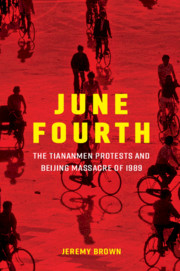Crossref Citations
This Book has been
cited by the following publications. This list is generated based on data provided by Crossref.
2021.
Sikh Nationalism.
p.
263.
2021.
An Urban History of China.
p.
274.
2021.
Books received.
The China Quarterly,
Vol. 247,
Issue. ,
p.
931.
Gao, Jia
2022.
Societal dynamics in China’s recent past: a scoping review of the research literature.
International Review of Sociology,
Vol. 32,
Issue. 2,
p.
238.
Spivey, Brian
2022.
The December 12th Student Movement: Uyghur Student Protest in Reform-Era China.
The Journal of Asian Studies,
Vol. 81,
Issue. 4,
p.
727.
2022.
BIBLIOGRAPHY.
International Review of Social History,
Vol. 67,
Issue. 1,
p.
161.
Frazier, Mark W.
2023.
“Single Sparks” and Legacies: An Eventful Account of the May Fourth Movement.
The China Quarterly,
Vol. 253,
Issue. ,
p.
1.
2023.
Middle Imperial China, 900–1350.
p.
416.
Tagirova, Alsu
2023.
Defining the Borderlands: Sino-Soviet Border Talks and the Nationalities Issue (1987–1991).
Nationalities Papers,
Vol. 51,
Issue. 2,
p.
299.
Zhang, Yang
and
Shi, Feng
2024.
The micro-foundations of elite politics: conversation networks and elite conflict during China’s reform era.
Theory and Society,
Vol. 53,
Issue. 1,
p.
193.
Desposato, Scott W.
Zurich, Cal
and
Wu, Jason Y.
2024.
The participatory legacy of mobilization and repression: evidence from a student movement.
Social Movement Studies,
p.
1.
Desposato, Scott
Zurich, Cal
and
Wu, Jason Y
2024.
Nationalist Erosion after Protest and Repression.
Public Opinion Quarterly,
Vol. 88,
Issue. 3,
p.
886.
Li, Promise
2024.
From Mimeographs to Self-organization.
Radical History Review,
Vol. 2024,
Issue. 150,
p.
33.
HERRERA, YOSHIKO M.
and
KYDD, ANDREW H.
2024.
Don’t Look Back in Anger: Cooperation Despite Conflicting Historical Narratives.
American Political Science Review,
Vol. 118,
Issue. 3,
p.
1174.



